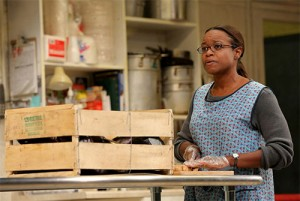Heidi Schreck on the moral questions in Grand Concourse
---
After I saw Heidi Schreck's play
Grand Concourse, I made a mistake. The show left me uncomfortable, so I thought that meant I didn't like it.
But I realized I was wrong: The play, which is at Playwrights Horizons through November 30, is successful
because it makes me uneasy. Lots of writers tell me what I think I want to hear, but Schreck forces me to consider things about myself that are no less true for being unpleasant.
Specifically, she deals with forgiveness. Set in a Bronx soup kitchen,
Grand Concourse follows a nun named Shelley who's trying to reconcile her crisis of faith with her strong desire to help people. Soon enough, she meets a volunteer named Emma, a troubled but charismatic young woman who hurts Shelley (and others around her) several times.
So can Shelley keep forgiving Emma for causing her pain? Or is there a limit to how much one human being can possibly overlook?
When I recently spoke to Schreck, who is Playwrights Horizons' first
Tow Foundation playwright in residence, we discussed
Grand Concourse's moral compass and the stark realities of forgiveness.
---
Mark Blankenship: What made you want to tackle forgiveness as a theme in
Grand Concourse?
Heidi Schreck: I came to the play with the question of how forgiveness works generally and more specifically how it works for me. It's a question that has haunted me for a long time. I grew up in a family of do-gooders in the best sense of the word. My parents ran a home for homeless kids and really devoted their whole lives to our community. They taught me that forgiveness was what one ought to give, no matter what happened.
MB: Which can be easier said than done.
HS: Oh yes. As I got older, I began to realize that I didn't fully understand what that meant and that I had a more superficial relationship to it than I realized. I got into the question of "Is everything forgivable"? Well, clearly not everything. But putting aside great acts of evil, are there small, personal acts that are also unforgivable? And how do you decide? And what is forgiveness anyway?
MB: Without giving too much away, I can tell you that I was deeply struck by Shelley and Emma's conversation about this very subject at the end of the play. Did you start the script knowing it would end there?
HS: At first I thought the play was about this younger woman inspiring this older woman who has lost faith in her vocation. But then I realized Emma was not as honest as I thought she was.
{Image1}
MB: Right. Which makes it harder to deliver the tidy ending where everyone feels good and makes soup.
HS: The traditional narrative is that you forgive someone, and then ideally your faith in them is rewarded because they go on to confirm that your act of forgiveness was warranted. They become a better person or you become closer to them. Some good comes out of it. But I was thinking how that's not always been true in my own life and thinking about that horrible punch to the gut when someone you've forgiven turns around and betrays you again. That only became clear while I was in the middle of the play.
MB: And obviously, since Shelley is a nun, you're filtering that concept of repeated forgiveness through a religious lens, which adds this dimension of people who are supposed to forgive because it's literally their job.
HS: I stayed in a convent for several nights, just to hang out with some nuns, and there was a 96 year-old priest who was the monsignor where I was staying. I presented him the situation with Emma and asked him what he would do. We had a very long conversation, and he kept saying, "Well, this girl clearly needs love. I would love her." And I kept saying, "But how? How does that actually happen in real life? What does that mean? Do you give her more responsibility? Do you shut her out?" And at some point he said, "Well, there's such a thing as prudent love."
MB: What did you think of that answer?
HS: I felt like it could be considered a cop-out, but I also thought it makes sense. At some point you have to make a decision about how much you keep giving a person who keeps hurting you.
MB: Have you been discussing this question with audience members as well?
HS: That's been a great thing about the play. I've found myself in a lot of thorny conversations with people, and it's a more interesting thing to discuss than, "Did you like it? Was it funny?" It's been exciting to have those conversations.
---
Mark Blankenship is TDF's online content editor
Photos by Joan Marcus. Top photo: Quincy Tyler Bernstein as Shelley.
